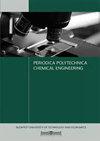Investigations on Applied Microbiology Regarding Carbon Capture, and Fermentative Production of the Ingredients in Sweeteners, Agricultural Biosurfactants and Cosmetics
IF 1.8
4区 工程技术
Q3 ENGINEERING, CHEMICAL
引用次数: 0
Abstract
Regarding the celebration of the Faculty of Chemical Technology and Biotechnology 150 years, we want to highlight our recent results in the Fermentation Pilot Plant Laboratory (F-labor) which have a focus on applied microbiology. In all of our research activities, we first select an appropriate microorganism for the desired tasks, then optimize its cultivation and product formation, finally investigate process scale up and economics. Here we want to shortly summarize and introduce 4 pillars of our recent research topics: 1. carbon capture by microalga cultures, 2. complex utilization of Yarrowia yeasts with main focus on erythtritol production, 3. bacterial formation of biosurfactants and their use against plant pathogenic fungi on the field of agrobiotechnology and 4. development of different fermented cosmetic ingredients with major focus on Lactobacilli. Regarding microalga cultivation among many methodical developments we could build successfully a 850 L scale tank reactor for Spirulina cultivation. In term of Yarrowia non-conventional yeast complex biotechnology utilization was demonstrated from erythritol to cosmetic applications. Agricultural biosurfactants were successfully applied against Alternaria alternata plant pathogenic fungi. Finally Lactobacilli based cosmetic ingredients were proved to be potential skin-moistening agents.甜味剂、农业生物表面活性剂和化妆品中碳捕获和发酵生产的应用微生物学研究
关于化学技术和生物技术学院150周年的庆祝活动,我们想强调我们在发酵中试工厂实验室(F-labor)的最新成果,该实验室专注于应用微生物学。在我们所有的研究活动中,我们首先选择合适的微生物来完成所需的任务,然后优化其培养和产品形成,最后研究工艺规模和经济性。在这里,我们想简要总结和介绍我们最近的研究课题的四大支柱:1。微藻培养的碳捕获,2。2 .以生产赤藓糖醇为主的耶氏酵母的复合利用;生物表面活性剂的细菌形成及其在农业生物技术和抗植物病原真菌方面的应用以乳酸菌为主的不同发酵化妆品原料的开发。在许多有条理的发展中,关于微藻的培养,我们可以成功地建立一个850 L规模的螺旋藻培养槽反应器。在耶氏菌方面,从赤藓糖醇到化妆品应用证明了非常规酵母复合生物技术的应用。农业生物表面活性剂已成功地应用于防治交替稻瘟菌植物病原真菌。最后证明了乳杆菌类化妆品成分是潜在的润肤剂。
本文章由计算机程序翻译,如有差异,请以英文原文为准。
求助全文
约1分钟内获得全文
求助全文
来源期刊

Periodica Polytechnica Chemical Engineering
ENGINEERING, CHEMICAL-
CiteScore
3.10
自引率
7.70%
发文量
44
审稿时长
>12 weeks
期刊介绍:
The main scope of the journal is to publish original research articles in the wide field of chemical engineering including environmental and bioengineering.
 求助内容:
求助内容: 应助结果提醒方式:
应助结果提醒方式:


